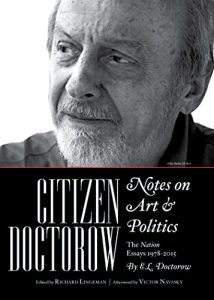The novelist E.L. Doctorow, who died in 2015, will long be remembered for his highly imaginative historical fiction. In intricate and profound works like Ragtime, Billy Bathgate, The March and many others, Doctorow helped redefine American fiction by subverting our received ideas about the past and offering a radical critique of contemporary culture.
Yet Doctorow often saved his most daring and charged prose for his non-fiction, especially his numerous essays published over four decades in The Nation, a journal of which he was a longtime supporter. Collected here for the first time—with an afterword by longtime Nation editor Victor Navasky—Doctorow’s Nation essays show a brilliant writer probing through the detritus of American politics and culture for glimpses of intact American ideals. Often he finds them; sometimes, painfully, he does not.
Whether paying homage to a literary ancestor, F. Scott Fitzgerald, or celebrating art as "a natural resource as critical to us and our identity and our survival as are our oil, our coal, our timber," the essays collected in Citizen Doctorow are an unforgettable account of the American scene as understood by one of its most penetrating observers. Together, they offer a conclusive proof that, as Faulkner, one of Doctorow’s greatest influences, once put it, “The past is never dead. It’s not even past.”
Yet Doctorow often saved his most daring and charged prose for his non-fiction, especially his numerous essays published over four decades in The Nation, a journal of which he was a longtime supporter. Collected here for the first time—with an afterword by longtime Nation editor Victor Navasky—Doctorow’s Nation essays show a brilliant writer probing through the detritus of American politics and culture for glimpses of intact American ideals. Often he finds them; sometimes, painfully, he does not.
Whether paying homage to a literary ancestor, F. Scott Fitzgerald, or celebrating art as "a natural resource as critical to us and our identity and our survival as are our oil, our coal, our timber," the essays collected in Citizen Doctorow are an unforgettable account of the American scene as understood by one of its most penetrating observers. Together, they offer a conclusive proof that, as Faulkner, one of Doctorow’s greatest influences, once put it, “The past is never dead. It’s not even past.”






